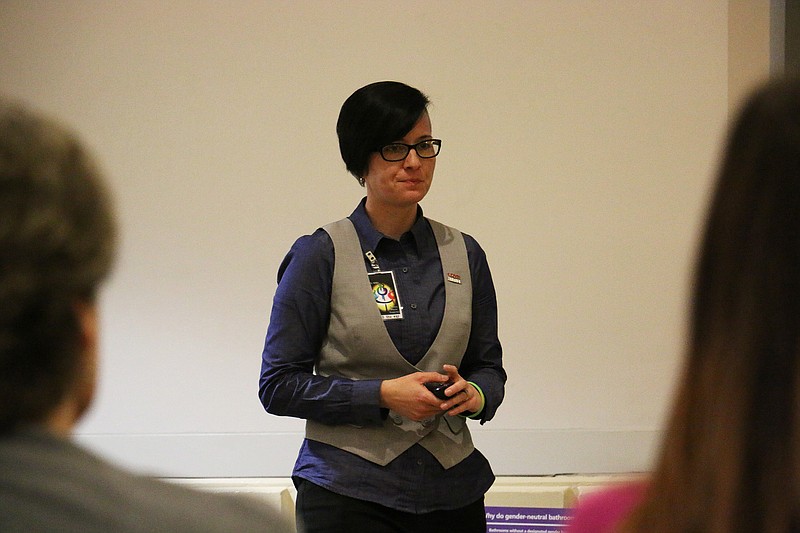Community Conversation speakers share online resources related to LGBT equality, advocacy
[]Shelly Farnan and Joshua Castillo decided to do something to help educate the health care community the lesbian, gay, bisexual, transgender (LGBT) issues a little more than two years ago. Farnan decided to get involved in educating others after hearing patients' stories in her work as a psychologist.
"The health disparities and knowing that we can help improve - that is really my main motivating factor," Farnan said. "When you start hearing patients come to you and tell you these stories that bring tears to your eyes, you can't help but get up and do something. You don't want to just continue to sit and listen."
Castillo and Farnan were the speakers for the Fulton State Hospital's Cultural Competence Committee Community Conversation Tuesday and Wednesday.The two presenters covered a wide range of topics including how to respectfully care for LGBT patients and the high number of domestic violence cases in the LGBT community.
Research has shown, Farnan said, that the LGBT population has a fear of interacting with health care and mental healthcare providers. Castillo stressed the importance of educating health care professionals on what is considered appropriate language, how to be respectful and to ask questions when they aren't familiar.
"People shouldn't be re-victimized by their hurt at a doctor's office or mental health provider because they didn't know enough to address the person in a respectful manor or didn't realize what they were doing was more hurtful than the reason the person originally came in," Castillo said.
Medical schools, Castillo said, are starting to "catch up" when it comes to diversity training. However, current health care professionals who graduated from school a decade ago didn't learn how to speak about transgender issues or how to ask about their transgender patients' sexual health. Medical school 10 years ago, he said, didn't teach students how to feel comfortable talking about a gay or lesbian patient's reproductive options.
"My training in graduate school consisted of three hours - and I don't mean a three (credit) hour course I mean three actual clock hours - talking about gays and lesbians in a diversity course and there was no conversation about transgender," Castillo, who earned a master's degree in social work, said. "I think schools are doing a better job now but you can't learn everything you need in school."
Castillo said his passion comes from experiences he has had in his life.
"I don't want this to happen to other people. It doesn't need to happen," Castillo said.
He made the transition from being a woman to being a man in his 30s. During Wednesday's session, he shared his experiences and talked about what he looks for in a health care provider to feel comfortable as well as what his expectations are. He wants a health care provider who is comfortable prescribing his hormones. Additionally, Castillo said he appreciates a health care provider asking about his sexual health - a conversation he said most physicians are uncomfortable having in a non-judgmental way.
Both Castillo and Farnan emphasized the importance of terminology - an area Castillo said changes rapidly. He said the language he used eight years ago is different from what is used today. Farnan said health care providers should have the vulnerability to say they don't know and want to learn more.
To treat patients respectfully, Farnan said health care providers should have conversations with their patients about how they want to be treated rather than treating patients how they think they want to be treated.
Castillo said throughout the two days of sessions, he noticed attendees wanted to learn and were also concerned about being respectful.
"I can definitely tell they want information but they don't want to hurt anybody's feelings or disrespect anyone in the process," Castillo said. "Really that's just fantastic."
Farnan said there is a safety in that culture. She stressed the importance of being able to talk as a group knowing that each other are speaking in a respectful and vulnerable way.
"The culture that Fulton State Hospital has developed in talking about the scary stuff, specifically LBGT ... when we come back, I'm just reminded of how ahead of the game Fulton State Hospital is with LGBT culture."

